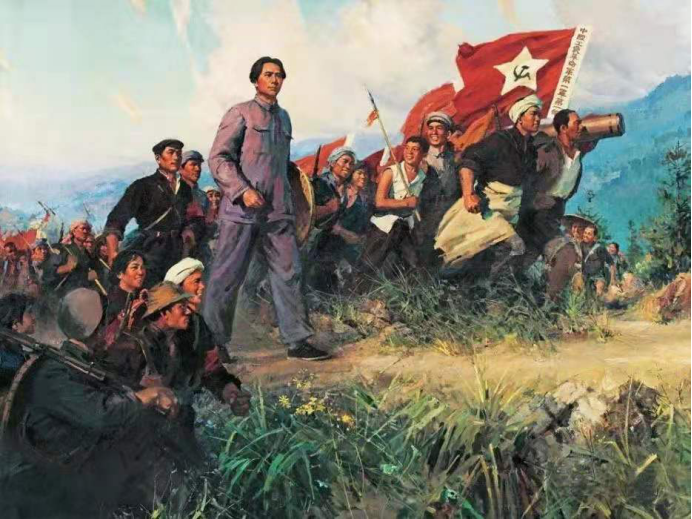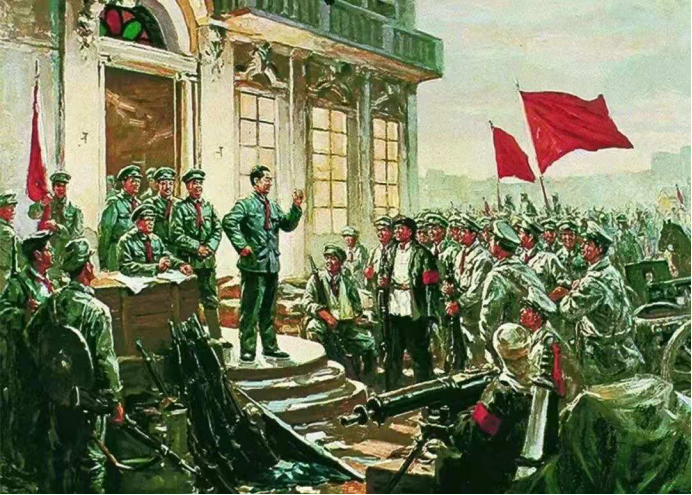
TheAgrarian Revolutionary War was the decade long (1927-1937) confrontation between the Communist Party of China led Chinese Workers' and Peasants' Red Army and the Chinese people against Chiang Kai-Shek's ruling Kuomintang Party,toward the abolition of the feudal land system, and the founding of the workers' and peasants' democratic republic.
Mao Zedong, who had become a Marxist at the time of the emergence of the May Fourth Movement, had boundless faith in the revolutionary potential of the peasantry. He advocated that revolution in China focus on them rather than on the urban proletariat. During the Agrarian Revolutionary War period, with Mao Zedong as representative, Chinese communists came from the countryside; successfully surrounded the cities; and seized power through armed struggle. Mao Zedong demonstrated a new, theoretical road for the Chinese revolution, stressing "indoctrination and the integration of Marxism into the actual conditions of China. "Mao Zedong Thought was officially formed.
Making revolution in a large Eastern semi-colonial, semi-feudal country was bound to meet with many special, complicated problems which cannot be solved by reciting the general principles of Marxism-Leninism or by copying foreign experience in every detail. The erroneous tendency of making Marxism a dogma and deifying Comintern resolutions and the experience of the Soviet Union prevailed in the international communist movement. In the the Communist Party of China, mainly in the late 1920s and early 1930s, this tendency pushed the Chinese revolution to the brink of total failure. It was in the course of combating this tendency and making a profound summary of China's historical experience in this respect that Mao Zedong thought took shape and developed.
A new policy was instituted calling on the Communist Party of China to foment armed insurrections in both urban and rural areas in preparation for an expected rising tide of revolution. Unsuccessful attempts were made by Communists to take cities such as Nanchang, Changsha, Shantou, and Guangzhou, and an armed rural insurrection, known as the Autumn Harvest Uprising, was staged by peasants in Hunan Province.
In PROBLEMS OF STRATEGY IN CHINA'S REVOLUTIONARY WAR, Mao Zedong wrote in December 1936 that "The Agrarian Revolutionary War, lasting from 1927 to the present, has been waged under new conditions. The enemy in this war is not imperialism alone but also the alliance of the big bourgeoisie and the big landlords. And the national bourgeoisie has become a tail to the big bourgeoisie. This revolutionary war is led by the Communist Party alone, which has established absolute leadership over it. This absolute leadership is the most important condition enabling the revolutionary war to be carried through firmly to the end. Without it, it is inconceivable that the revolutionary war could have been carried on with such perseverance.
From the latter part of the Agrarian Revolutionary War to the War of Resistance against Japan, Chinese communists, represented by Mao Zedong, summed up the experience of the Chinese revolution and war, and critically analyzed the mistakes of dogma. In particular, they revealed the basic theories, route and principles of a new democratic revolution; and explained the Party's polices and strategies during democratic revolution. Mao Zedong thought started to mature.
1927年7月15日,蒋介石政府发动“七一五”政变,标志第一次国共合作失败,国民大革命失败。面对国民党的镇压屠杀,中国共产党员奋力反抗。1927年8月7日,中共中央召开八七会议,总结失败原因,并确立了以土地革命和武装反抗国民党的总方针。从此,中国土地革命兴起 。
1927年10月,毛泽东率领湘赣边界秋收起义部队到达井冈山北路宁岗县茅坪,创建第一个农村革命根据地井冈山革命根据地 。井冈山革命根据地的建立点燃了工农武装割据的星星之火,从实践上开辟了一条从农村开始,武装夺取政权的中国革命新道路。随后,赣南闽西根据地,湘赣根据地等根据地相继成立。中国共产党队伍力量不断壮大。随着红军和农村革命根据地的建立和发展,土地革命在中国共产党领导下广泛开展。在根据地内,中国共产党坚持消灭封建土地所有制,实行“耕者有其田”,开展打土豪、分田地、废除封建剥削土地制等活动。依靠贫农、雇农,联合中农,限制富农,保护中小工商业者,消灭地主阶级,变封建半封建的土地所有制为农民的土地所有制。

土地革命的深入开展使农村革命根据地面貌发生根本性变化,使被压迫的贫苦农民在经济和政治上翻身。中国共产党领导农民进行土地革命,使农民迅速分清共产党和国民党,共产党的土地政策极大地调动了农民支援革命战争、保卫和建设根据地的积极性。
土地革命摧毁了封建剥削制度,解放了农村生产力,从而极大地调动了农民发展生产和参军参战积极性,为红军的革命胜利和农村革命根据地的建设奠定了深厚的群众基础。
土地革命十年,是中国共产党从幼年走向成熟的重要时期。这十年中,党在指导思想上虽然几度犯过“左”倾错误,但最终依靠自己纠正错误,汲取教训,实行正确路线、方针和政策,实现从土地革命战争到抗日民族战争的转变,把中国革命推向新阶段。
心得体会:土地革命精神贯穿于中国共产党领导的各个时期,是中国共产党领导人民取得革命胜利的宝贵精神财富。为了解决好农民的土地问题,在长期的革命斗争中,中国共产党通过一系列的土地改革,确立了农民土地所有制。这场胜利打倒了地主阶级,摧毁了帝国主义和国民党蒋介石等人为首的集团实现反革命复辟的社会基础,极大地提高了广大农民的政治觉悟,农民翻身成为农村主人,从而巩固了工农联盟,加强了工人阶级领导的、以工农联盟为基础的人民民主专政的政权。广大农民说得好:“过去头顶地主的天,脚踏地主的地,现在都成为我们的了”。
中国共产党的土地法,到现在已经非常完善,几代农民已经享受了其带来的益处,农民当家做主人早已经成为现实,更多的农民会从中获利,未来的农业状况必定会更加美好。
—商务英语202团支部
刘梓涵
外国语学院团总支宣传部
图文/刘梓涵 权雅璇
编辑/陈思祯
排版/赵佳祺
审校/杨秦钰